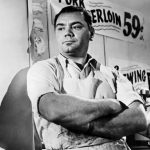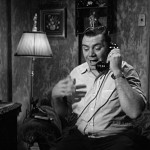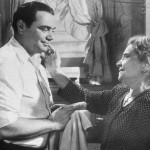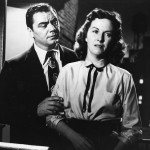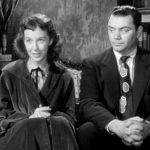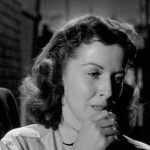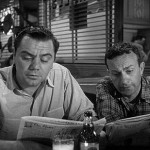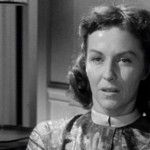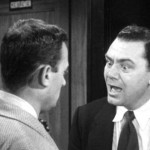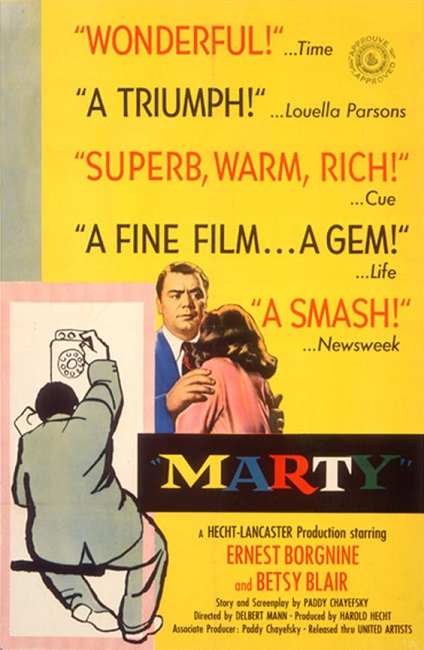
Marty – 1955
I have to start this review by saying that this was a very sweet movie. The story was a good one on a number of levels. It was one that I think nearly everyone can identify with. It dealt with deep human emotions that made me feel strongly for the characters involved. The two leads did a great job and for a number of reasons, I really cared what happened to them. When the movie was over, I wanted it to keep going. I wanted to know what happened next.
The story revolves around the title character, Marty, played by Ernest Borgnine. He really was incredible in this film. Marty was a 35 year old single man who had very little experience with women. He had little self-esteem and little self-confidence. He seemed to be the loneliest guy in the world. But he was such a nice guy with such a gentle manner that I instantly liked him.
I think that most people have felt lonely and depressed at one time or another. Most of us have experienced insecurity when dealing with the opposite sex. So when we see what Marty is going through, we automatically want him to succeed. Everybody loves the underdog, and Marty is a complete emotional underdog. He even refers to himself as fat and ugly on more than one occasion.
Sure, jokes have been made about how Borgnine is such an unattractive actor. In fact, it was because he was not the typical Hollywood pretty-boy that he was cast in the role. But as we all know, a person’s personality can have a direct effect on how attractive or unattractive others perceive them to be. A handsome man who is a jerk will seem less physically attractive. On the flip side, an unattractive man who is a great guy will seem to be more handsome to others. And despite all his handicaps and his lousy luck with women, he does his best to maintain a positive attitude. He desperately wants to find love.
Marty is a butcher who lives at home with his Italian mother, played by Esther Minciotti. His best friend Angie, played by Joe Mantell, is constantly trying to get Marty to go out with him to meet women. However, Angie’s motives are more selfish than generous. He really only wants Marty along as his wing-man. One Saturday night, Marty’s mother convinces him to go out to a dance-club and Angie goes with him.
But as fate would have it, Marty actually meets a girl. The trick is that he meets the homeliest girl in the club. She is Clara, played by Betsy Blair. She is just as shy, lonely and emotionally damaged as Marty. Because she is not a beauty, she has an incredibly low opinion of herself. At the club, her blind date treats her horribly and abandons her. Marty sees her crying and approaches her to comfort her. She is so distraught that before she even knows who he is, she breaks down and cries into his shoulder. It is always hard to see someone in that much pain, even when it is a fictional character in a movie.
But love can arise out of the most terrible situations. Marty and Clara really hit it off and spend the rest of the evening together. They talk, they laugh, they confide in each other and in the end, they fall in love. Borgnine and Blair did a fantastic job of conveying the excitement of new love on the screen. I smiled with them and cheered them on, wanting them to overcome their fears and mental blocks, and hoping for the success of their relationship. It was a situation that they were both so unaccustomed to, that neither of them knew exactly how to relate to each other. Their behavior was so believable and well written.
Borgnine was particularly wonderful to watch. I have always liked him as an actor, but he really shined in this role. He did an incredible job and really deserved the Best Actor Oscar he was awarded. The scene after he takes Clara home is really satisfying to watch. He is so happy that he has met someone worth being in love with, and knowing that she feels the same way about him, he is nearly running through the streets with joy!
The conflict comes when Angie, who on some level is actually envious of Marty’s new relationship, makes fun of Clara, calling her a dog and convincing Marty to brush her off. As a spectator, I was heartbroken when he gave in to peer-pressure and failed to call Clara as he promised. I was so emotionally involved that I was ready to shout at the screen, “Call her you idiot! Call her!” The single scene that shows Clara at home watching TV with her parents, waiting for Marty to call, and all the while silently crying in supreme disappointment, shame and loneliness was just like a knife to my heart. I felt so bad for her.
But it all turned out well in the end. When faced with the prospect of another boring night of misery and lonely sorrow, Marty finally finds the courage to fight back. Addressing his friends who have convinced him to stay with them rather than pursuing the homely Clara, he finally does the right thing. His little speech at the end brings the relief that the audience is hoping for and it is worth repeating here.
“You don’t like her, my mother don’t like her, she’s a dog and I’m a fat, ugly man! Well, all I know is I had a good time last night! I’m gonna have a good time tonight! If we have enough good times together, I’m gonna get down on my knees and I’m gonna beg that girl to marry me! If we make a party on New Year’s, I got a date for that party. You don’t like her? That’s too bad!”
It made for a great and satisfying ending. The movie made the point that there is somebody for everybody, and when you find the person who is right for you, never let them go. I have to give two thumbs up to Paddy Chayefsky for his excellent screenplay. He also deserved the Oscar he won for his work on the film.
Interesting note: The running time of the film is 90 minutes, making it the shortest movie to ever win the Academy Award for Best Picture.
